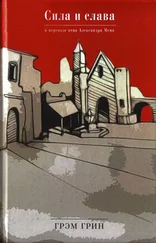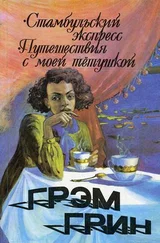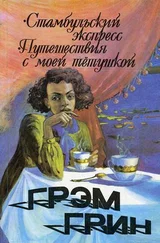Грэм Грин - The Comedians
Здесь есть возможность читать онлайн «Грэм Грин - The Comedians» весь текст электронной книги совершенно бесплатно (целиком полную версию без сокращений). В некоторых случаях можно слушать аудио, скачать через торрент в формате fb2 и присутствует краткое содержание. Год выпуска: 1966, Жанр: Классическая проза, на английском языке. Описание произведения, (предисловие) а так же отзывы посетителей доступны на портале библиотеки ЛибКат.
- Название:The Comedians
- Автор:
- Жанр:
- Год:1966
- ISBN:нет данных
- Рейтинг книги:3 / 5. Голосов: 1
-
Избранное:Добавить в избранное
- Отзывы:
-
Ваша оценка:
- 60
- 1
- 2
- 3
- 4
- 5
The Comedians: краткое содержание, описание и аннотация
Предлагаем к чтению аннотацию, описание, краткое содержание или предисловие (зависит от того, что написал сам автор книги «The Comedians»). Если вы не нашли необходимую информацию о книге — напишите в комментариях, мы постараемся отыскать её.
The Comedians — читать онлайн бесплатно полную книгу (весь текст) целиком
Ниже представлен текст книги, разбитый по страницам. Система сохранения места последней прочитанной страницы, позволяет с удобством читать онлайн бесплатно книгу «The Comedians», без необходимости каждый раз заново искать на чём Вы остановились. Поставьте закладку, и сможете в любой момент перейти на страницу, на которой закончили чтение.
Интервал:
Закладка:
'I don't want to get you into any trouble with the authorities.'
'I'm not afraid of trouble,' Mr Smith said, 'with any authorities.'
3
The office of the Secretary of State was in one of the exhibition buildings near the port and the Columbus statue. We passed the musical fountain that never played now, the public park with its Bourbon pronouncement: 'Je suis le drapeau Haпtien, Uni et Indivisible, Franзois Duvalier', and came at last to the long modern building of cement and glass, the wide staircase, the great lounge with many comfortable armchairs lined with the murals of Haitian artists. It bore as little relation to the beggars of the Post Office square and the shanty-town as Christophe's palace of Sans Souci, but it would make a much less picturesque ruin.
The lounge contained more than a dozen middle-class people, fat and prosperous. The women in their best dresses of electric blues and acid greens chattered happily to each other as though they were taking their morning coffee, looking sharply up at every newcomer. Even a suppliant in this lounge bore himself with importance in an air filled with the slow tap of typewriters. Ten minutes after we arrived Seсor Pineda walked heavily through with the certitude of diplomatic privilege. He smoked a cigar and looked at no one and without asking a by-your-leave passed through one of the doors which opened on to an inner balcony.
'The Secretary's private office,' I explained. 'The South American ambassadors are still persona grata. Especially Pineda. He hasn't any political refugees in his embassy. Not yet.'
We waited for three-quarters of an hour, but Mr Smith showed no impatience. 'It seems very well organized,' he said once, when the suppliants were reduced by two after a brief conference with a clerk. 'A minister has to be protected.'
At last Pineda passed out through the lounge, still smoking a cigar — it was a fresh one. The band was on it: he never removed his bands because they were stamped with his monogram. This time he gave me a bow of recognition — for a moment I thought he was going to pause and speak to me; his bow must have attracted the attention of the young man who accompanied him to the head of the stairs, for he returned and asked us with courtesy what we wanted.
'The Secretary of State,' I said.
'He is very busy with the foreign ambassadors. There is a great deal to discuss. You see tomorrow he is leaving for the United Nations.'
'Then I think he should see Mr Smith at once.'
'Mr Smith?'
'You haven't read today's paper?'
'We have been very busy.'
'Mr Smith arrived yesterday. He is the Presidential Candidate.'
'The Presidential Candidate?' the young man said with incredulity. 'In Haiti?'
'He has business in Haiti — but that is a matter for your President. Now he would like to see the Minister before he leaves for New York.'
'Please wait here a moment.' He passed into one of the offices on the inner court and came out, hurriedly, a minute later carrying a newspaper. He knocked on the Minister's door and went in.
'You know, Mr Brown, that I'm no longer a presidential candidate. We made our gesture once and for all.'
'There's no need to explain that here, Mr Smith. After all you belong to history.' I could see in those pale-blue honest eyes that perhaps I had gone a little too far. I added, 'A gesture like yours is there for everyone to read' — I could not specify where. 'It belongs to this year as much as to the past.'
The young man stood beside us — he had left the newspaper behind. 'If you would come with me …'
The Secretary of State flashed his teeth at us with great amiability. I saw the newspaper lying at the corner of his desk. The palm he held out to us was large, square, pink and humid. He told us in excellent English how interested he had been to read of Mr Smith's arrival and how he had hardly hoped to have the honour, since he was leaving for New York tomorrow … There had been no word from the American Embassy, or else of course he would have arranged a time …
Since the President of the United States, I said, had seen fit to recall his ambassador, Mr Smith thought it better to make his visit unofficially.
The Secretary said he saw my point. He added to Mr Smith, 'I understand you are seeing the President …'
'Mr Smith has not yet asked for an audience. He was anxious to see you first — before you land in New York.'
'I have to make my protest before the United Nations,' the Minister explained with pride. 'Will you have a cigar, Mr Smith?' He offered his leather case and Mr Smith took one. I noticed that the band bore the monogram of Seсor Pineda.
'Protest?' Mr Smith asked.
'The raids from the Dominican Republic. The rebels are being supplied with American arms. We have evidence.'
'What evidence?'
'Two men were captured carrying revolvers manufactured in the United States.'
'I'm afraid you can buy such things anywhere in the world.'
'I have been promised the support of Ghana. And I hope other Afro-Asian countries …'
'Mr Smith has come about quite a different matter,' I interrupted them. 'A great friend of his who was travelling with him was arrested yesterday by the police.'
'An American?'
'An Englishman called Jones.'
'Has the British Embassy made inquiries? This is really a matter concerning the Secretary for the Interior.'
'But a word from you, Your Excellency …'
'I cannot interfere with another department. I'm sorry. Mr Smith will understand.'
Mr Smith pushed his way into our dialogue with a roughness I had not known him to possess. 'You can find out what the charge is, can't you?'
'Charge?'
'Charge.'
'Oh — charge.'
'Exactly,' Mr Smith said. 'Charge.'
'There will not necessarily be a charge. You are anticipating the worst.'
'Then why keep him in prison?'
'I know nothing about the case. I suppose there is something to be investigated.'
'Then he ought to be brought before a magistrate and put on bail. I will stand bail for any reasonable amount.'
'Bail?' the Minister said, 'Bail?' He turned to me with a gesture of appeal from his cigar. 'What is bail?'
'A kind of gift to the state if a prisoner should not return for trial. It can be quite a substantial amount,' I added.
'You've heard of Habeas Corpus, I suppose,' Mr Smith said.
'Yes. Yes., Of course. But I have forgotten so much of my Latin. Virgil. Homer. I regret that I no longer have time to study.'
I said to Mr Smith, 'The basis of the law here is supposed to be the Code Napolйon.'
'The Code Napolйon?'
'There are certain differences from the Anglo-Saxon law. Habeas Corpus is one of them.'
'A man has to be charged surely.'
'Yes. Eventually.' I spoke rapidly to the Minister in French. Mr Smith understood little French, even though Mrs Smith had reached the fourth lesson in Hugo's. I said, 'I think a political mistake has been made. The Presidential Candidate is a personal friend of this man Jones. You ought not to alienate him just before your visit to New York. You know the importance in democratic countries of being friendly with the opposition. Unless the affair is of really great importance, I think you should let Mr Smith see his friend. Otherwise he will undoubtedly believe that he has been — perhaps — ill-treated.'
'Does Mr Smith speak French?'
'No.'
'You see, there is always the possibility that the police may have exceeded their instructions. I wouldn't want Mr Smith to get a bad impression of our police procedure.'
'Couldn't you send in a reliable doctor first — to tidy up?'
'Of course there would be nothing really to conceal. It is only that sometimes a prisoner misbehaves. I am sure even in your own country …'
Читать дальшеИнтервал:
Закладка:
Похожие книги на «The Comedians»
Представляем Вашему вниманию похожие книги на «The Comedians» списком для выбора. Мы отобрали схожую по названию и смыслу литературу в надежде предоставить читателям больше вариантов отыскать новые, интересные, ещё непрочитанные произведения.
Обсуждение, отзывы о книге «The Comedians» и просто собственные мнения читателей. Оставьте ваши комментарии, напишите, что Вы думаете о произведении, его смысле или главных героях. Укажите что конкретно понравилось, а что нет, и почему Вы так считаете.



